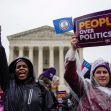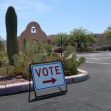The struggle to preserve fair elections is now facing another challenge. When the United States Supreme Court (SCOTUS) begins its October 2022-2023 term, it will hear a case that asks whether state legislatures, not state courts, have the sole constitutional authority to regulate federal elections. This means that it will be possible for a governor and legislative majority from the same party to override the choice of the voters. State courts will be powerless to stop them or to protect democratic elections and the bedrock democratic principle of one person, one vote.
The case is Moore v. Harper. It arrived at the U.S. Supreme Court via a writ of certiorari from the North Carolina Supreme Court at the request of Timothy K. Moore, the Speaker of the State’s House of Representatives.
According to Ballotpedia, the question before the Supreme Court will be: “Whether a State’s judicial branch may nullify the regulations governing the “Manner of holding Elections for States and Representatives…prescribed by the Legislature thereof.” This is a quote from the elections clause of the U.S. Constitution. It then adds, “and replace them with regulations of the state’s courts’ own devising, based on vague state constitutional provisions purportedly vesting the state judiciary with power to prescribe whatever rules it deems appropriate to ensure a ‘fair’ or ‘free’ election.”
Speaker Moore, who no doubt had something to do with the phrasing of the question, is asking SCOTUS to approve what is being called “the independent state legislature doctrine” (ISLA), one of the Republicans’ new strategies to control elections throughout the country by giving state legislatures various powers to justify ignoring the peoples’ choices.
ISLA is a theory that purports that state legislatures alone have the Constitutional authority to regulate federal elections without any oversight from state courts. Those promoting the theory argue that the elections clause of the U.S. Constitution, “empowers states to determine the time, place, and manner of congressional elections, subject to Congress’s authority to make or alter state regulations.” Thus, they believe state legislators have the sole power to set rules and regulations for elections.
This theory was also used in Bush v. Gore, when SCOTUS, under Chief Justice William Rehnquist, stopped the Florida presidential vote recount because it conflicted with deadlines created by the Florida legislature. Justice Clarence Thomas, the only Supreme Court justice from that period who remains on the Court today, joined Rehnquist’s opinion.
Moore v. Harper began as Harper v. Hill in November 2021, when the North Carolina legislature, which was controlled by Republicans, approved a new map that Democrats believed was gerrymandered to allow Republicans to gain two more Congressional representatives. They sued, and in February 2022, the North Carolina Supreme Court blocked the state from using the flawed map in 2022. A new map was created by three experts approved by a trial court.
Republican state legislators did not like the revised map and asked SCOTUS to reinstate the original map before the state’s May 17 primary. The High Court, with dissents from Alito, Thomas and Gorsuch, rejected the request, but Justice Brett Kavanaugh opened the door for future review when he called ISLA “an important question.” Alito said the questions should be resolved “the sooner the better.”
While rejecting the map, Justice Robin Hudson wrote, “Today we answer this question: does our state constitution recognize that the people of this state have the power to choose those who govern us, by giving each of us an equally powerful voice through our vote? Or does our constitution give to members of the General Assembly, as they argue here, unlimited power to draw electoral maps that keep themselves and our members of Congress in office as long as they want, regardless of the will of the people, by making some votes more powerful than others?
“We hold that our constitution’s Declaration of Rights guarantees the equal power of each person’s voice in our government through voting in elections that matter.” Justice Roberts went on to criticize her “dissenting colleagues” for overlooking the fundamental reality of the case. She said those who created the map were “overreaching” and that the court has a duty to “step in to keep the General Assembly from taking away the state constitutional rights of the people…This we cannot countenance.”
North Carolina legislators, headed by Speaker Moore, returned to the U.S. Supreme Court in March 2022 seeking review of the state Supreme Court’s order for a new map and urged that the issue be resolved prior to the November 2022 election.
Other North Carolina officials argued that ISLA was not relevant in this case because the North Carolina legislature had specifically given the state’s courts the power to create and use a “temporary redistricting plan.” SCOTUS agreed to review the case on June 30, 2022. It will be argued during the 2022-2023 term and will most likely be decided in the spring of 2023.
On the day SCOTUS agreed to hear Moore v. Harper, several media outlets ran stories that showed skepticism and concern. National Public Radio (NPR) ran the headline, “The Supreme Court could radically reshape elections for president and Congress.” It said the case could “upend elections laws across the country with the potential endorsement of a fringe legal theory about how much power state legislatures have over the running of congressional and presidential elections.”
The Washington Post said the Supreme Court “will consider what would be a fundamental change in the way federal elections are conducted, giving state legislatures sole authority to set rules for contests even if their actions violated state constitutions and resulted in extreme partisan gerrymandering for congressional seats.”
Amid the nation suffering from what many have termed Post Covid Stress Disorder, the overturning of Roe v. Wade, the January 6 hearings, and reports of further intrusions on fundamental rights by scores of governors and secretaries of state, Moore v. Harper could be one more nail in democracy’s coffin.






